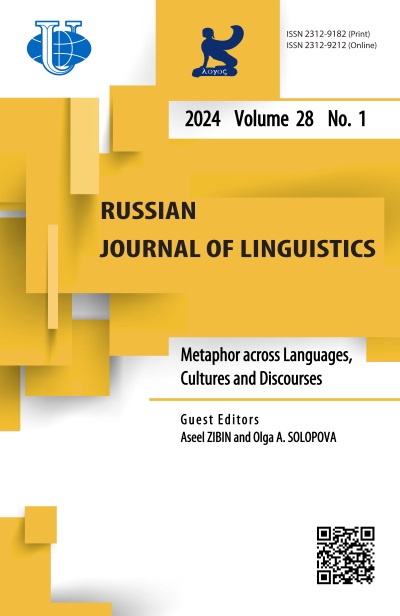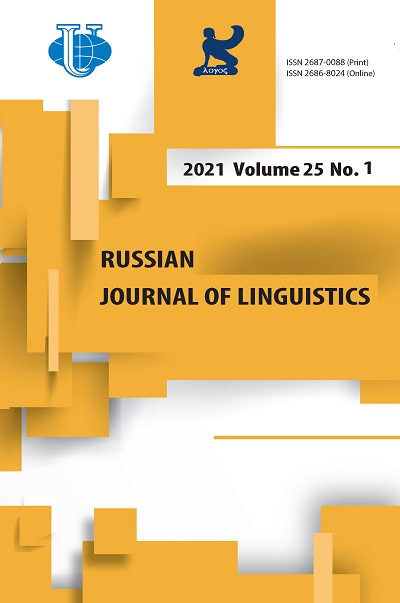The dynamics of political correctness, inclusive language and freedom of speech
- Authors: Leontovich O.A.1,2
-
Affiliations:
- Volgograd State Socio-Pedagogical University
- Tianjin Foreign Studies University
- Issue: Vol 25, No 1 (2021)
- Pages: 194-220
- Section: Articles
- URL: https://journals.rudn.ru/linguistics/article/view/26004
- DOI: https://doi.org/10.22363/2687-0088-2021-25-1-194-220
Cite item
Full Text
Abstract
The study aims to research the historical dynamics of the notions ‘political correctness’, ‘inclusive language’ and ‘freedom of speech’, as well as to reveal the mechanisms and new tendencies of their realization in public discourse. The sources of practical material are represented by: a) 126 journal and Internet articles; b) 12 speeches of famous US and British politicians, scholars and celebrities reflecting the notions under study. The leading methods include critical discourse analysis, definition and contextual analyses. The research indicates that during its long and contradictory history, the term ‘political correctness’ had both positive and negative connotations. When the negative attitude started to prevail, it was replaced by the notions ‘inclusion’ and ‘inclusive language’ based on similar mechanisms: ban on the use of offensive terms denoting different aspects of people’s identity; avoidance of stereotypes and false semantic associations; abundant use of euphemisms, etc. The paper reveals the new trends in the English language (non-binary expression of gender; changes in the conceptualization of race, age and disability) and social practices meeting the requirements of inclusive communication. Whereas political correctness and inclusive language aim to protect vulnerable social groups and improve the social climate, they produce certain undesirable tendencies: breach between social groups caused by inefficient communication; reverse racism; complex relationship of political correctness with science, literature and education; its speculative use; and restrictions on freedom of speech. The study also sheds light on the problems of politically correct intercultural communication caused by the non-stop language change, differences in social norms, values, grammatical structures, semantics, and cultural associations.
About the authors
Olga A. Leontovich
Volgograd State Socio-Pedagogical University; Tianjin Foreign Studies University
Author for correspondence.
Email: olgaleo@list.ru
Doctor habil., is Professor and Chair of the Department of Intercultural Communication and Translation at Volgograd State Socio-Pedagogical University (Volgograd, Russia) and Professor of Tianjin Foreign Studies University (Tianjin, China). She has authored over 220 publications. Her research interests embrace communication studies, discourse analysis, cultural anthropology, sociolinguistics and intercultural communication
27 Lenin Prospect, Volgograd, 400066, Russia; Tianjin, ChinaReferences
- Иванова О.Ф. Политкорректность в России // Вестник Евразии. 2002. С. 62-71 [Ivanova, Olimpiada F. 2002. Politkorrektnost' v Rossii (Political correctness in Russia). Vestnik Evrazii 62-71]
- Леонтович О.А. Методы коммуникативных исследований. М.: Гнозис, 2011. 224 с. [Leontovich, Olga A. 2011. Metody kommunikativnyh issledovanij (Methods of communication research). Moscow: Gnozis. 224 p.]
- Леонтович О.А. Русские и американцы: парадоксы межкультурного общения. М.: Гнозис, 2005. 341 с. [Leontovich, Olga A. 2005. Russkie i amerikancy: paradoksy mezhkul'turnogo obshhenija (Russians and Americans: paradoxes of intercultural communication). Moscow: Gnozis. 341 p.]
- Леонтович О.А., Якушева Е.В. Понимание - начало согласия: межкультурная семейная коммуникация. М.: Гнозис, 2014. 224 с. [Leontovich, Olga A., Yakusheva, Ekaterina V. 2014. Ponimanie - nachalo soglasija: mezhkul'turnaja semejnaja kommunikacija (Understanding as the beginning of agreement). Moscow: Gnozis. 224 p.]
- Майба В.В. Политическая корректность как лингвоидеологическое явление и ее рецепция в русской лингвокультуре. Ростов-на-Дону: РГУПС, 2016. 107 с. [Majba, Vita V. 2016. Politicheskaja korrektnost' kak lingvoideologicheskoe javlenie i ee recepcija v russkoj lingvokul'ture (Political correctness as a lingua-ideological phenomenon and its reception in Russian culture). Rostov-na-Donu: RGUPS. 107 p.]
- Палажченко М.Ю. К вопросу о политической корректности, настоящей и мнимой, и политике двойных стандартов // Вестн. Моск. ун-та. Сер. 19, Лингвистика и межкультурная коммуникация. М., 2004. №1. С. 81-89 [Palazhchenko, Marina Ju. 2004. K voprosu o politicheskoj korrektnosti, nastojashhej i mnimoj, i politike dvojnyh standartov (The problem of political correctness, real and imaginary). Vestnik Mosk. un-ta. Ser. 19, Lingvistika i mezhkul'turnaja kommunikacija 1. 81-89]
- Рубина Н.Б. Эфемизм и политическая корректность в современном английском языке // Вестник РУДН. Серия Лингвистика. 2011. №4. С. 35-40 [Rubina, Nonna B. 2011. Jefemizm i politicheskaja korrektnost' v sovremennom anglijskom jazyke (Euphemism and political correctness in modern English). Vestnik RUDN 4. 35-40]
- Савватеева Л.В. Метаязык коммуникации: лингвистическая политкорректность и социальная толерантность // Вестник Тамбовского университета. Серия: Гуманитарные науки. 2008. Вып. 10 (66). С. 27-32 [Savvateeva, Ljubov' V. 2008. Metajazyk kommunikacii: lingvisticheskaja politkorrektnost' i social'naja tolerantnost’ (Metalanguage of communication: linguistic political correctness and social tolerance). Vestnik Tambovskogo universiteta 10 (66). 27-32]
- Цурикова Л.В. Политическая корректность как социокультурный и прагмалингвистический феномен // Эссе о социальной власти языка / Под ред. Л.И.Гришаевой. Воронеж: Воронежский государственный университет, 2001. С. 94-103 [Curikova, Ljubov' V. 2001. Politicheskaja korrektnost' kak sociokul'turnyj i pragmalingvisticheskij fenomen (Political correctness as a sociocultural and pragmalinguistic phenomenon). In L.I. Grishaeva (eds.), Jesse o social'noj vlasti jazyka (Essay on social power of language). 94-103. Voronezh: Voronezhskij gosudarstvennyj universitet]
- Швейцер А. Д. Некоторые проблемы языковой политики в США // Известия Российской Академии наук. Серия литературы и языка. 1996. № 2. С. 11-16 [Shvejcer, Alexandr D. 1996. Nekotorye problemy jazykovoj politiki v SShA (Some problems of linguistic policy in the USA). The Bulletin of the Russian Academy of Sciences: Studies in Literature and Language 2. 11-16]
- Ayim, Maryann. 1998. Just how correct is political correctness? A critique of the opposition’s arguments. Argumentation 12. 445-80
- Berezow, Alex. 2016. Political correctness prevents advancement of science. American Council of Science and Health. URL: https://www.acsh.org/news/2016/08/11/political-correctness-prevents-advancement-of-science (аccessed 12 August, 2020)
- Blommaert, Jan. 2005. Discourse. A Critical Introduction. Cambridge, Cambridge University Press.
- Daniels, Anthony. Medical correctness. The New Criterion. Vol. 35. № 5. (January, 2017): 29.
- Fairclough, Norman. 2003a. Analysing discourse. New York, Routledge.
- Fairclough Norman. 2003b. Political correctness: The politics of culture and language. Discourse and Society 14 (1). 17-28. doi: 10.1177/0957926503014001927
- Fox, Claire. 2018. I find that offensive. Biteback Publishing.
- Haney López, Ian. 2014. Dog whistle politics: How coded racial appeals have reinvented racism and wrecked the middle class. Oxford University Press, USA.
- Hall, Stuart. 1994. Some “politically incorrect” pathways through PC. In S. Dunant (eds.), The War of the Words: The Political Correctness Debate. 164-184. London: Virago Press
- Hughes, Geoffrey. 2009. Political correctness: A history of semantics and culture. Wiley-Blackwell
- Kimball, Roger. 1998. Тenured radicals: How politics corrupted our higher education. New York: Harper Collins
- Kuran, Timur. 1995. Private truths, public lies. Cambridge: Harvard University Press
- Larina, Tatiana, Vladimir Ozyumenko & Douglas Mark Ponton. 2019/2020. Persuasion strategies in media discourse about Russia: Linguistic ambiguity and uncertainty. Lodz Papers in Pragmatics 15 (1). 3-22. doi: 10.1515/lpp-2019-0002
- Lessing, Doris. 2001. Censorship and the climate of opinion. Foreword in Censorship: A World Encyclopedia. vii - x. Fitzroy Dearborn Publishers
- Moller, Dan. 2020. Dilemmas of political correctness. Journal of Practical Ethics. URL: http://www.jpe.ox.ac.uk/papers/dilemmas-of-political-correctness/ (accessed 11 August, 2020)
- Morgan, Piers. 2020. Wake up. HarperCollins Publishers
- Murray, Douglas. 2019. The madness of crowds. Bloomsbury
- Perry, Ruth. 1992. A short history of the term ‘politically correct’. In Patricia Aufderheide (ed.), Beyond PC: Toward a politics of understanding. Graywolf Press.
- Roper, Cynthia. Political correctness. In: Encyclopaedia Britannica. URL: https://www.britannica.com/topic/political-correctness (Accessed 5 July, 2020).
- Schwartz, Howard S. 2016. Political correctness and the destruction of social order. Springer International Publishing AG.
- Sparrow, Jeff. 2018. Trigger warnings. Scribe Publications.
- Weiss, Gilbert & Ruth Wodak (eds.). 2007. Critical discourse analysis: theory and interdisciplinarity. London, Basingstoke, New York: Palgrave, Macmillan.
- Аксенов В. В поисках грустного бэби. М.: Изографус; ЭКСМО-Пресс, 2000. 560 с. [Aksyonov, Vasily. 2000. V poiskakh grustnogo bebi (In Search of Melancholy Baby). Moscow: Izografus; EKSMO-Press.]
- Краусс Л. The Wall Street Journal (США): Развращающее влияние идеологии на науку 18.07.2020 [Krauss, Lawrence. Razvrashhajushhee vlijanie ideologii na nauku (The corrupting influence of ideology on science) (in Russ.)]. URL: https://inosmi.ru/ social/20200718/247776659.html (accessed: 20 July, 2020)
- AAPA Statement on Race & Racism. URL: https://physanth.org/about/position-statements/aapa-statement-race-and-racism-2019/ (accessed: 23 July, 2020)
- A letter on justice and open debate. 2020. Harpers’. URL: https://harpers.org/a-letter-on-justice-and-open-debate/ (accessed: 12 August, 2020)
- Chow, Kat. 2016. ‘Politically correct’: The phrase has gone from wisdom to weapon. Code Switch. URL: https://www.npr.org/sections/codeswitch/2016/12/14/505324427/ politically-correct-the-phrase-has-gone-from-wisdom-to-weapon (accessed: 15 June, 2020)
- Crespo, Gisela. 2020. American Cancer Society now recommends cervical cancer screening start at 25, not 21. CNN. URL: https://edition.cnn.com/2020/07/30/health/new-cervical-cancer-screening-recommendations-wellness/index.html#:~:text=%28CNN%29%20 Individuals%20with%20a%20cervix%20are%20now%20recommended,guideline%20released%20Thursday%20by%20the%20American%20Cancer%20Society (accessed: 17 August, 2020)
- Garcia, Laleña. 2018. Mirrors and Windows. Black Lives Matter at NYC Schools. URL: https://blmedu.wordpress.com/2018/01/31/mirrors-and-windows-by-lalena-garcia/ (accessed: 14 July, 2020)
- Gibson, Caitlin. 2016. How ‘politically correct’ went from compliment to insult. Washington Post. URL: https://www.washingtonpost.com/lifestyle/style/how-politically-correct-went-from-compliment-to-insult/2016/01/13/b1cf5918-b61a-11e5-a76a-0b5145e8679a_ story.html?utm_term=.19da582509e3 (accessed: 3 July, 2020)
- Goldman, Russell. 2014. Here’s a list of 58 gender options for Facebook users. URL: https://abcnews.go.com/blogs/headlines/2014/02/heres-a-list-of-58-gender-options-for-facebook-users (accessed: 18 June, 2020)
- Hamilton C. 2015. Political correctness: its origins and the backlash against it. The Conversation. URL: https://theconversation.com/political-correctness-its-origins-and-the-backlash-against-it-46862 (accessed: 23 July, 2020)
- Hannah, Mark. 2016. Political correctness is an absolute must. Time. URL: https://time.com/4405217/trump-political-correctness-obama/ (accessed: 8 July, 2020)
- Inclusive language. 2020. Graduate Writing Center, Seattle University. URL: https://www.seattleu.edu/education/graduate-writing-center/style--language/inclusive-language/#:~:text=What%20is%20inclusive%20language%3F,as%20part%20of%20a%20group. (accessed: 5 June, 2020)
- Karlson, Jay. 2006. 10 ridiculous cases of political correctness. URL: http://listverse.com/ 2010/10/26/10-ridiculous-cases-of-political-correctness/ (accessed: 24 May, 2020)
- Lopez, German. 2016. The sneaky language today’s politicians use to get away with racism and sexism. Vox. URL: https://www.vox.com/2016/2/1/10889138/coded-language-thug-bossy (accessed 18 May, 2020)
- Maher, Bill. 2016. Bill Maher pens blistering essay on Hillary as “Charlie Brown”, Trump and Why Bernie Sanders, socialist, can win. The Hollywood Reporter. URL: https://www.hollywoodreporter.com/features/bill-maher-pens-blistering-essay-hillary-as-charlie-brown-trump-why-bernie-sanders-socialist-can-win-863493 (accessed: 19 July, 2020)
- Messent, Peter. 2011.Censoring Mark Twain's ‘n-words’ is unacceptable. The Guardian
- Mounk, Yascha. 2018. Americans strongly dislike PC culture. The Atlantic
- “My needs are not special”. URL: https://hellomichelleswan.com/my-needs-are-not-special/ (accessed: 6 August, 2020)
- О’Connor А.М. 2019. Should you be using gender-neutral language with your kids? She KNOWS. URL: https://www.sheknows.com/parenting/articles/2115116/gender-neutral-parenting-terms/ (accessed: 15 June, 2020)
- Ross, Janell. 2015. White Americans long for the 1950s, when they didn’t face so much discrimination. The Washington Post
- Sundeyeva, Tatyana. 2010. Political correctness gone too far? Кстати. Russian American News and Views. URL: http://kstati.net/political-correctness-gone-too-far/ (accessed: 1 August, 2020)
- Syrett, Kristen. 2020. The language of racism: Why it’s time to get rid of master bedroom, cake walk, grandfather clause. URL: https://www.wbur.org/hereandnow/2020/07/23/language-racism-enslavement (Accessed 15 May, 2020)
- Weigel, Moira. 2016. Political correctness: how the right invented a phantom enemy. The Guardian.
- What is diversity & inclusion? Global Diversity Practice. URL: https://globaldiversitypractice.com/what-is-diversity-inclusion/ (accessed: 15 June, 2020).
- World Wide Words. Investigating the English language across the globe: Niggardly. URL: https://www.worldwidewords.org/qa/qa-nig1.htm (accessed: 15 June, 2020).
- Brotman, Stuart. 2016. For Trump, being politically incorrect is now ‘PC’. URL: https://thehill.com/blogs/pundits-blog/presidential-campaign/288840-trumps-politically-correct-paradox (accessed: 17 June, 2020)
- Ely, Robin J., Debra Meyerson, Martin N. Davidson. 2006. Rethinking political correctness. Harvard Business Review. https://hbr.org/2006/09/rethinking-political-correctness (accessed: 1 June, 2020)
- Roper, Cynthia. 2013. Political correctness. Encyclopaedia Britannica URL: https://www.britannica.com/topic/political-correctness (accessed: 5 July, 2020)

















